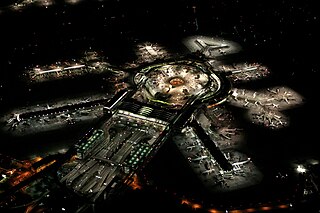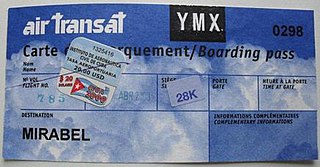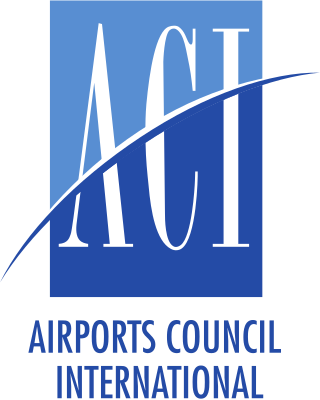
An airport is an aerodrome with extended facilities, mostly for commercial air transport. They usually consist of a landing area, which comprises an aerially accessible open space including at least one operationally active surface such as a runway for a plane to take off and to land or a helipad, and often includes adjacent utility buildings such as control towers, hangars and terminals, to maintain and monitor aircraft. Larger airports may have airport aprons, taxiway bridges, air traffic control centres, passenger facilities such as restaurants and lounges, and emergency services. In some countries, the US in particular, airports also typically have one or more fixed-base operators, serving general aviation.

A codeshare agreement, also known simply as codeshare, is a business arrangement, common in the aviation industry, in which two or more airlines publish and market the same flight under their own airline designator and flight number as part of their published timetable or schedule. Typically, a flight is operated by one airline while seats are sold for the flight by all cooperating airlines using their own designator and flight number.

Airport security includes the techniques and methods used in an attempt to protect passengers, staff, aircraft, and airport property from malicious harm, crime, terrorism, and other threats.

An airport terminal is a building at an airport where passengers transfer between ground transportation and the facilities that allow them to board and disembark from an aircraft.

A low-cost carrier (LCC) or low-cost airline, also called a budget, or discount carrier or airline, is an airline that is operated with an emphasis on minimizing operating costs. It sacrifices certain traditional airline luxuries for cheaper fares. To make up for revenue lost in decreased ticket prices, the airline may charge extra fees, such as for carry-on baggage.

An interactive kiosk is a computer terminal featuring specialized hardware and software that provides access to information and applications for communication, commerce, entertainment, or education.
Aeronautical Radio, Incorporated (ARINC), established in 1929, was a major provider of transport communications and systems engineering solutions for eight industries: aviation, airports, defense, government, healthcare, networks, security, and transportation. ARINC had installed computer data networks in police cars and railroad cars and also maintains the standards for line-replaceable units.

An international airport is an airport with customs and border control facilities enabling passengers to travel between countries. International airports are usually larger than domestic airports, and feature longer runways and have facilities to accommodate heavier aircraft such as the Boeing 747 and the Airbus A380 commonly used for international and intercontinental travel. International airports often host domestic flights, which helps feed both passengers and cargo into international ones.

A boarding pass or boarding card is a document provided by an airline during airport check-in, giving a passenger permission to enter the restricted area of an airport and to board the airplane for a particular flight. At a minimum, it identifies the passenger, the flight number, the date, and scheduled time for departure. A boarding pass may also indicate details of the perks a passenger is entitled to and is thus presented at the entrance of such facilities to show eligibility.

An electronic ticket is a method of ticket entry, processing, and marketing for companies in the airline, railways and other transport and entertainment industries.

In aviation, aircraft ground handling or ground operations defines the servicing of an aircraft while it is on the ground and (usually) parked at a terminal gate of an airport.

SITA is a multinational information technology company providing IT and telecommunication services to the air transport industry. The company provides its services to around 400 members and 2,500 customers worldwide, which it claims is about 90% of the world's airline business. Around the world, nearly every passenger flight relies on SITA technology.

In aviation, ACARS is a digital datalink system for transmission of short messages between aircraft and ground stations via airband radio or satellite. The protocol was designed by ARINC and deployed in 1978, using the Telex format. More ACARS radio stations were added subsequently by SITA.

The term hand luggage or cabin baggage refers to the type of luggage that passengers are allowed to carry along in the passenger compartment of a vehicle instead of a separate cargo compartment. Passengers are allowed to carry a limited number of smaller bags with them in the vehicle, which typically contain valuables and items needed during the journey. There is normally storage space provided for hand luggage, either under seating, or in overhead lockers. Trains usually have luggage racks above the seats and may also have luggage space between the backs of seats facing opposite directions, or in extra luggage racks, for example, at the ends of the carriage near the doors.

Bag tags, also known as baggage tags, baggage checks or luggage tickets, have traditionally been used by bus, train, and airline carriers to route checked luggage to its final destination. The passenger stub is typically handed to the passenger or attached to the ticket envelope:
- to aid the passenger in identifying their bag among similar bags at the destination baggage carousel;
- as proof—still requested at a few airports—that the passenger is not removing someone else's bag from the baggage reclaim hall; and
- as a means for the passenger and carrier to identify and trace a specific bag that has gone astray and was not delivered at the destination. The carriers' liability is restricted to published tariffs and international agreements.

Check-in is the process whereby people announce their arrival at an office, hotel, airport, hospital, seaport or event.

Airport check-in is the process whereby an airline approves airplane passengers to board an airplane for a flight. Airlines typically use service counters found at airports for this process, and the check-in is normally handled by an airline itself or a handling agent working on behalf of an airline. Passengers usually hand over any baggage that they do not wish or are not allowed to carry in the aircraft's cabin and receive a boarding pass before they can proceed to board their aircraft.

An airline ticket is a document or electronic record, issued by an airline or a travel agency, that confirms that an individual is entitled to a seat on a flight on an aircraft. The airline ticket may be one of two types: a paper ticket, which comprises coupons or vouchers; and an electronic ticket.
The VHF Data Link or VHF Digital Link (VDL) is a means of sending information between aircraft and ground stations. Aeronautical VHF data links use the band 117.975–137 MHz assigned by the International Telecommunication Union to Aeronautical mobile (R) service. There are ARINC standards for ACARS on VHF and other data links installed on approximately 14,000 aircraft and a range of ICAO standards defined by the Aeronautical Mobile Communications Panel (AMCP) in the 1990s. Mode 2 is the only VDL mode being implemented operationally to support Controller Pilot Data Link Communications (CPDLC).

Airports Council International (ACI) is an organization of airport authorities, informing members of industry practices and airport standards. Established in 1991, its headquarters are based in Montreal, Quebec, Canada, and its members operate more than 2000 airports.


















